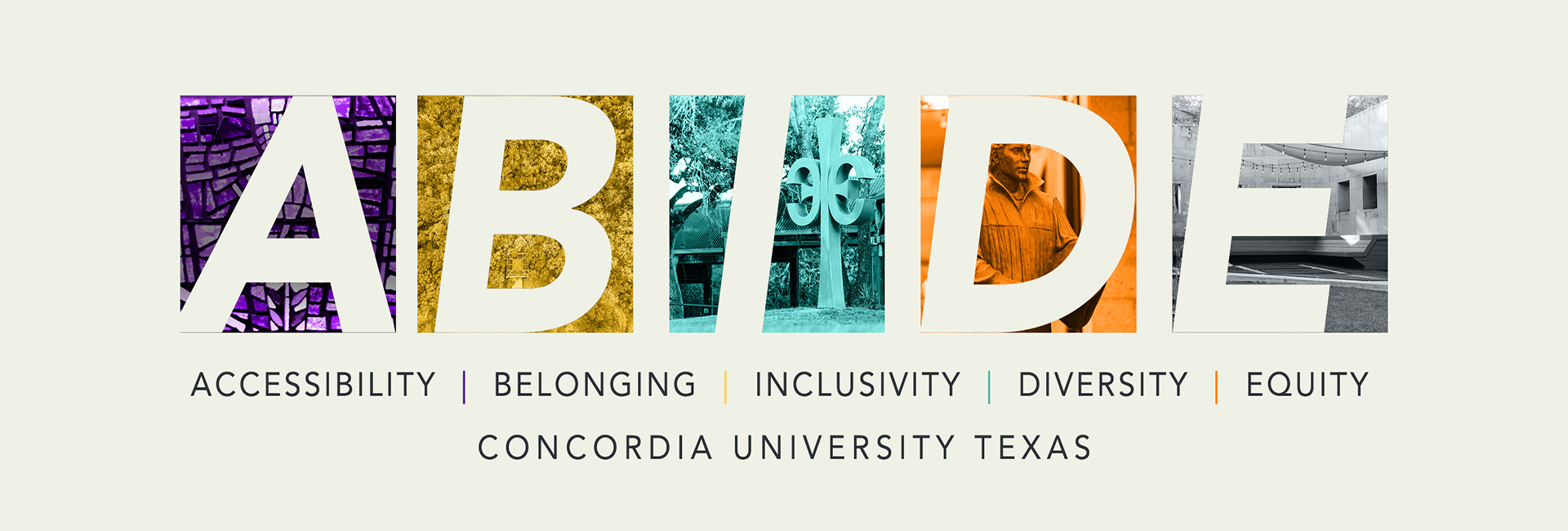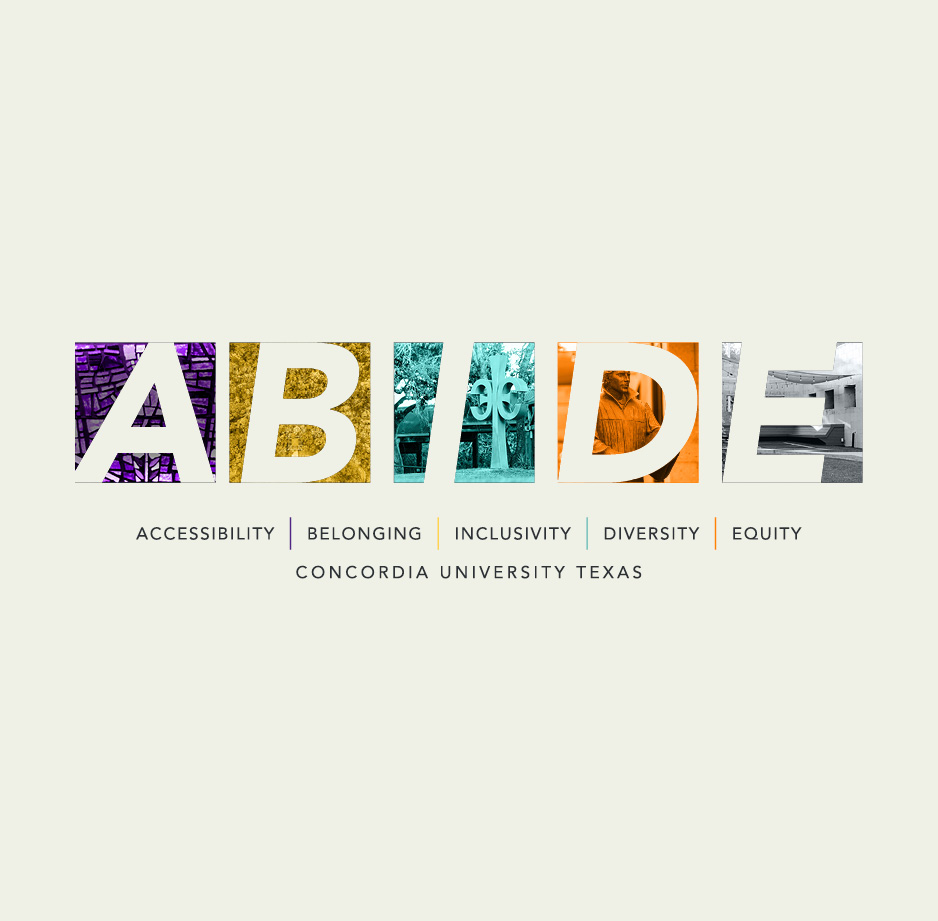Access, Belonging, Inclusion, Diversity, and Equity
The Concordia University Texas ABIDE initiative seeks to promote the values of access, belonging, inclusion, diversity, and equity throughout our campus while focusing on the University’s strategic objective to close equity gaps that exist among our student body, faculty, and staff.
As a Christ-centered, Lutheran institution, our core belief is that all people are created in God's image and therefore receive His unwavering love, and inherent dignity, offered through Christ Jesus. This fundamental belief causes us to recognize the God given worth of every person and serves as the driving force behind our commitment to establishing a community where every individual feels truly valued, genuinely heard, and genuinely supported.
In line with our Christian faith, we understand the significance of abiding in God. By abiding in Him, we are welcomed into His eternal family and united in a strong and interconnected community. By embracing the principles of abiding and nurturing a relationship with Jesus, we foster a sense of togetherness and unity within our community. In John 15:4-5, Jesus teaches us the power of abiding in Him, explaining that it enables us to bear much fruit and find strength in our shared journey. This understanding further reinforces our commitment to creating an environment where each person can thrive and contribute to the collective growth of our community.
Through our ABIDE initiative, we strive to create an environment where people of all backgrounds can come together to reason, think, believe, learn, create, and succeed. To live out this commitment, we engage in ongoing dialogue, practice empathy and patience, and cultivate trust and courage. We recognize that achieving true accessibility, belonging, diversity, inclusion, and equity requires intentional effort and continuous reflection, and we are committed to this journey as a community.
In all our efforts, we seek to follow the example of Jesus Christ, who taught us to love our neighbors as ourselves and to serve those in need. By living out our ABIDE initiative and Lutheran identity, we can create a community where everyone can thrive and positively impact the world.
ACCESS
Access to higher education refers to the belief that all individuals, regardless of their background or circumstances, should have the opportunity to pursue higher education. It embodies the idea that every person is valued and deserving of an education that aligns with their potential and purpose. It recognizes that every individual should have the chance to develop their God-given talents and abilities through education.
Jesus consistently committed to reaching out to the marginalized, the outcast, and the oppressed, offering them hope, healing, and restoration. He challenged societal barriers and embraced those often excluded or disregarded by society. This outreach extended to his teachings, where he welcomed all who sought to learn and grow their understanding of God's truth.
BELONGING
Belonging refers to a deep sense of connection, acceptance, and inclusion within a particular group, community, or environment. It encompasses feeling valued, understood, and appreciated for who you are while experiencing a sense of connectedness and shared purpose with others. By cultivating a strong sense of belonging, higher education institutions enable students to engage in campus life's academic and social aspects fully.
From a Christian perspective, belonging extends beyond mere inclusion and acceptance. It reflects the understanding that, as children of God, we are all part of a larger family united by our faith. It is a recognition that we belong to the body of Christ, where everyone has a unique role and contributes to the overall well-being and growth of the community.
INCLUSION
Inclusion refers to the deliberate and active practice of creating an environment where all individuals are welcomed, valued, and respected, regardless of their differences or backgrounds. From a Christian perspective, inclusion aligns with the principles of love, justice, and compassion taught by Jesus Christ. It recognizes the inherent worth and dignity of every person as creations of God. It emphasizes the call to treat others with respect and fairness, embracing the diversity of individuals as part of God's design.
Inclusive higher education environments recognize the importance of representation, accessibility, and accommodation. They strive to create a campus community where individuals from various backgrounds feel welcomed, supported, and empowered to contribute their unique perspectives and talents to the educational experience.
DIVERSITY
Diversity in the context of higher education encompasses the multitude of backgrounds, experiences, and perspectives that students, faculty, and staff bring to the learning environment. It goes beyond demographic dimensions and encompasses a broad spectrum of intellectual, cultural, and ideological differences.
From a Christian perspective, diversity in higher education aligns with the belief in the inherent worth and value of every individual as a creation of God. It recognizes that each person's unique experiences and perspectives contribute to the richness and depth of knowledge and understanding and equips them to navigate a complex and interconnected global society. It provides opportunities for meaningful dialogue, collaboration, and mutual learning, fostering an appreciation for the diversity of God's creation and promoting unity amidst differences.
EQUITY
Equity, in the context of Christian higher education, refers to the fair and just distribution of resources, opportunities, and support to ensure that every student has equal access and the necessary tools to succeed academically, personally, and spiritually. It recognizes and addresses systemic barriers and disparities that may hinder certain individuals or groups from fully participating and thriving within the educational community.
Christian higher education institutions embrace a holistic understanding of equity, recognizing that students may have diverse needs and circumstances. This entails providing individualized support, accommodations, and mentorship to ensure that every student can fully participate in the educational experience and have an equal opportunity to succeed.


